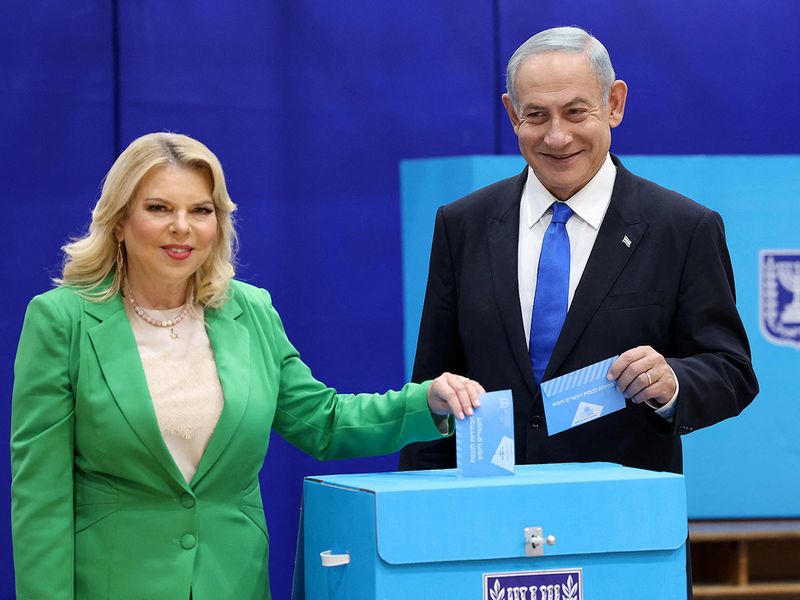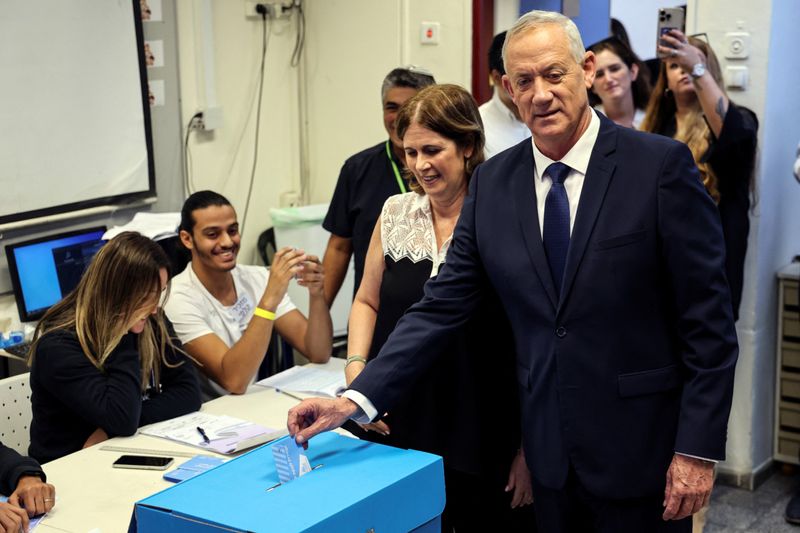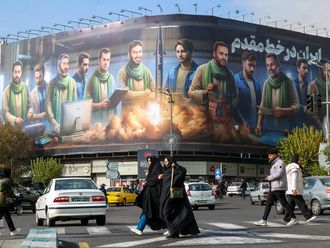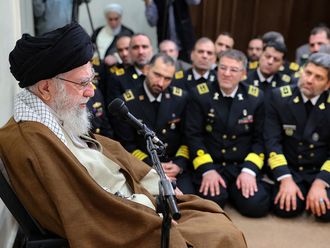
JERUSALEM: For the fifth time since 2019, Israelis were voting in national elections on Tuesday, hoping to break the political deadlock that has paralysed the country for the past three and a half years.
Although the cost of living is surging, Israeli-Palestinian tensions are boiling over and Iran remains a central threat, the foremost issue in the vote once again is former leader Benjamin Netanyahu and his fitness to serve amid corruption charges. His main rival is the man who helped oust him last year, the centrist caretaker Prime Minister Yair Lapid.
“These elections are (a choice) between the future and the past. So go out and vote today for our children’s future, for our country’s future,’’ Lapid said after voting in the upscale Tel Aviv neighbourhood where he lives.
Polls have predicted a similar result: stalemate. But a powerful new player is threatening to shake things up. Itamar Ben-Gvir, a leading far-right politician, has surged in opinion polls recently and will be seeking a harder line against the Palestinians if he helps propel Netanyahu to victory.
After he cast his vote in the West Bank colony where he lives, Ben-Gvir promised that a vote for his party would bring about a “fully right-wing government’’ with Netanyahu as prime minister.
With former allies and proteges refusing to sit under him while he is on trial, Netanyahu has been unable to form a viable majority government in the 120-seat Knesset, or parliament. His opponents, an ideologically diverse constellation of parties, are equally hamstrung in cobbling together the 61 seats needed to rule.
Tired of instability
That impasse has mired Israel in an unprecedented political crisis that has eroded Israelis’ faith in their democracy, its institutions and their political leaders.
“People are tired of instability, of the fact that the government is not delivering the goods,’’ said Yohanan Plesner, a former legislator who now heads the Israel Democracy Institute, a Jerusalem think tank.
Buoyed by his followers’ almost cult-like adoration, Netanyahu, 73, has rejected calls to step down by his opponents, who say someone on trial for fraud, breach of trust and accepting bribes cannot govern.
Netanyahu denies wrongdoing, but embarrassing details from his ongoing trial repeatedly make front page news.
In Israel’s fragmented politics, no single party has ever won a parliamentary majority, and coalition-building is necessary to govern. Netanyahu’s most likely path to the premiership requires an alliance with extremist ultra-nationalists and religious ultra-Orthodox parties.
These parties would demand key portfolios in a Netanyahu government, and some have promised to enact reforms that could make Netanyahu’s legal woes disappear.
The ultranationalist Religious Zionism party, whose provocative top candidate Ben-Gvir wants to deport Arab legislators and is a disciple of a racist rabbi who was assassinated in 1990, has promised to support legislation that would alter the legal code, weaken the judiciary and could help Netanyahu evade a conviction. Ben-Gvir, promising a tougher line against Palestinian attackers, this week announced he would seek the Cabinet post overseeing the police force.
Critics have sounded the alarm over what they see is a destructive threat to Israel’s democracy.
“If Netanyahu is triumphant,’’ wrote columnist Sima Kadmon in the Yediot Ahronot daily, “these will be the final days of the state of Israel as we have known it for 75 years.’’
Netanyahu’s Likud party has tried to tamp down worries, saying any changes to the legal code won’t apply to Netanyahu’s case and that the extremist elements of his potential coalition will be reined in.
Polls say the race is too close to predict
Netanyahu, currently opposition leader, paints himself as the consummate statesman and only leader capable of steering the country through its myriad challenges. .
Netanyahu was ousted last year after 12 years in power by the diverse coalition forged by Lapid, Netanyahu’s main challenger.
The coalition, made up of nationalists who oppose Palestinian statehood, dovish parties that seek a peace agreement, as well as for the first time in the country’s history, a small Arab Islamist party, united over their distaste for Netanyahu but collapsed this spring because of infighting.
The centrist Lapid, a former author and broadcaster who became premier as part of a power-sharing agreement, has portrayed himself as an honest and scandal-free change from the polarising Netanyahu.
In his short term as caretaker leader, Lapid welcomed President Joe Biden on a successful visit to Israel, led the country in a brief military operation against Gaza militants and signed a diplomatic agreement with Lebanon setting a maritime boundary between the enemy nations.
Still, Lapid’s chances to return to leadership are shaky. He is relying on voters from Israel’s Palestinian minority, who make up one fifth of the population. Their turnout is predicted to reach historic lows, but if they unexpectedly do come out to vote, that could slash the Netanyahu camp’s numbers.
After the votes are tallied, the parties have nearly three months to form a government. If they can’t, Israel will head to yet another election.
“I hope this time it will be final,’’ said Avi Shlush, a voter in Tel Aviv. “But it will not be final. We are heading to another election.’’
Here’s a look at the main players:

BENJAMIN NETANYAHU: After more than a year in the opposition, Israel’s longest-serving prime minister seeks a return to power while on trial on charges of fraud, breach of trust and accepting bribes. His Likud party is projected to remain the largest in the 120-seat Knesset, and he aims for a majority through support of ultra-Orthodox and ultra-nationalist allies.
Netanyahu’s campaign has focused on attacking the perceived shortcomings of the government that ousted him last year, and decrying its inclusion of an Arab party. Election polls project that his Likud party and its presumed allies are hovering close to the 61-seat parliamentary majority required to form a governing coalition.

YAIR LAPID: Israel’s caretaker prime minister took office in June after the ruling coalition he cobbled together disintegrated. He has campaigned on his government’s accomplishments in its limited time in office, including the recent maritime border deal with Lebanon.
Polls predict that Lapid’s Yesh Atid party will be the second-largest party, after Likud. It remains unclear whether he will once again be able to unite disparate parties and form a coalition instead of Netanyahu.

ITAMAR BEN-GVIR: The co-leader of the Religious Zionism party has a long history of anti-Arab rhetoric — including convictions for incitement and supporting a terrorist group. As a lawyer, he spent much of his career defending Jewish extremists in court.
His party is ardently pro-colony in the West Bank, takes an even harsher line toward Palestinians living there and has cast doubt on the loyalty of Israel’s own Palestinian minority. Many of its leaders are openly homophobic.
Ben-Gvir, heir to the outlawed racist Kach party, has pledged support for Netanyahu — and has hone so far as to promise to annul the former prime minister’s trial and to be put in charge of the country’s police force.
Religious Zionism is projected to balloon to the third-largest party in parliament, more than doubling in size since the last election and giving it a powerful voice in any Netanyahu government. In part it is buoyed by support from young ultra-Orthodox voters.

BENNY GANTZ: Israel’s defence minister joined forces with other former Netanyahu allies — including Justice Minister Gideon Saar — after the break-up of the last government. He has campaigned on the issues of national security and preventing Netanyahu from returning to power.
A campaign video released Sunday said: “We must stop the shame. We must stop the threat,’’ referring to the possibility of Ben-Gvir becoming a Cabinet minister. Gantz’s Machane Mamlachti is projected to win around 10 seats in parliament, which would likely make it the fourth largest.
Gantz appears to have the most crossover appeal of any of the members of the anti-Netanyahu bloc. He could become a key player in post-election coalition negotiations.











